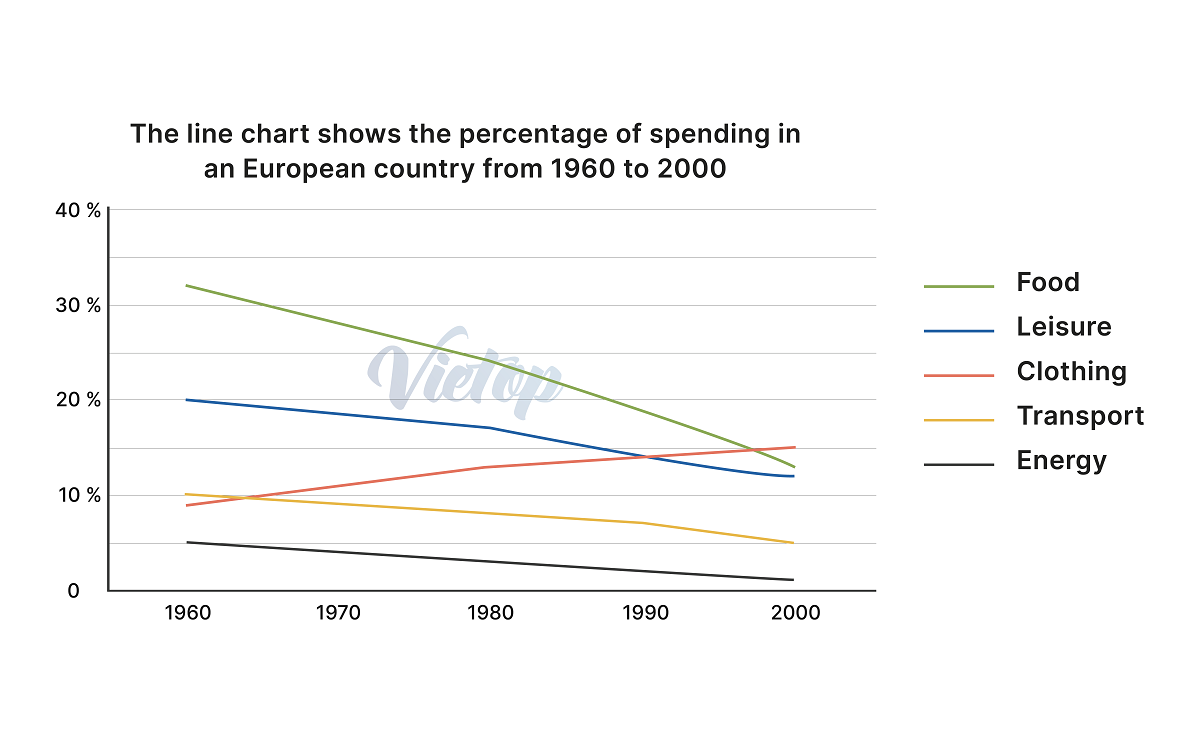Vietop gửi bạn bài Writing samples: Consumerism bên dưới nhé! Các bạn theo dõi và ôn luyện IELTS Writing thật tốt nhé!
Task 1
The line chart shows the percentage of spending in an European country from 1960 to 2000

The line graph compares how consumers from a particular European nation allocated their budget to various expenses over a four-decade period starting from 1960.
Overall, all the varieties of spending experienced a downward trend except for the amount spent on clothes. In addition, energy bills always made up the lowest expenditure throughout the period.
Nearly 35% of the total spending, the highest recorded percentage in the survey, was for food in 1960. This was followed by a fifth spent on leisure activities. The following years saw a narrowed gap between these figures as they declined to a low of roughly 15% each in 2000. Transport and energy spending bore a striking similarity when their proportions fell dramatically by approximately 5% from 10% and 5% respectively over the span.
The expenditure on clothing, in contrast, was on the increase after starting at under a tenth. This category, having doubled by the end of the period, became the costliest spending among those listed.
- allocate one’s budget to (v): phân bổ ngân sách cho
- expense (n): chi phí
- expenditure (n): sự chi tiêu
- the highest recorded percentage in the survey (n): tỷ lệ phần trăm cao nhất được ghi nhận trong cuộc khảo sát
- see a narrowed gap (v): chứng kiến khoảng cách được thu hẹp
- bear a striking similarity (v): có một điểm tương đồng nổi bật
Phân tích:
– Tất cả các khoản chi đều có xu hướng giảm ngoại trừ khoản chi cho quần áo.
– Khoảng chi cho năng lượng luôn chiếm mức thấp nhất trong suốt thời kỳ.
– Khoảng chi cho thực phẩm cao nhất vào năm 1960, nhưng khoản chi cho quần áo cao nhất vào năm 2000.
Tham khảo: Cách viết IELTS Writing Task 1 từ A – Z cho người mới bắt đầu
Task 2
Many people say that we now live in ‘consumer societies’ where money and possessions are given too much importance. Others believe that ‘consumer culture’ has played a vital role in improving our lives. Discuss both views and give your opinion.
Some believe that society places too much value on materialism, while others insist that such a lifestyle contributes to improving living standards. Although the latter is justifiable to a certain extent, the former is more convincing.
Among the various factors underlying the promotion of consumerism, the principal one is that material possessions form a tangible measurement of success. It is commonplace today for one to make hasty judgements about another’s achievements based on their residence and manner of dress. This urges working adults, especially recent graduates, to strive to move up the career ladder, hence securing better pay and increased monetary benefits. An income rise is bound to create more consumer demand for higher-quality products and services. When manufacturing thrives, more jobs are created, which in turn benefits the society as a whole.
Despite this legitimate argument, consumer culture should be regarded as more detrimental than beneficial as it threatens work-life balance and engineers other negative implications. In order to afford more material possessions, many workers have become workaholics, and overworking is now a widely popular work practice. The less time workers spend on their personal lives, the more their sense of well-being is negatively impacted. Not only can their mental and physical health deteriorate, but their relationships with friends and family may also suffer. Worse is that the mindset of acquiring wealth at all costs is nurtured by many individuals, some of whom may even resort to wrongdoings like embezzlement and fraud. This partly explains today’s moral decadence and individualism, leading to increasing indifference and selfishness.
In conclusion, however advantageous consumerism is to economic activity, it indisputably harms quality of life and is responsible for several severe societal consequences.
Tham khảo: Cách luyện IELTS Writing Task 2 ăn trọn điểm trong vòng 1 tháng
- Materialism (n): chủ nghĩa vật chất
- Consumerism (n): chủ nghĩa tiêu dùng
- Material possessions (n): của cải vật chất
- A measurement of success (n): một thước đo thành công
- Move up the career ladder (v): thăng tiến trong sự nghiệp
- Embezzlement (n): sự tham ô
- Moral decadence (n): sự suy đồi đạo đức
- Individualism (n): chủ nghĩa cá nhân
Phân tích:
Quan điểm: Xã hội đang quá trọng vật chất.
Vì sao quan điểm 1 đúng?
Của cải vật chất là một thước đo thành công.
=> Điều này khuyến khích mọi người phấn đấu trong sự nghiệp để có thu nhập tốt.
=> Nhu cầu chi tiêu trong xã hội tăng sẽ tạo ra nhiều việc làm hơn.
Vì sao quan điểm 2 đúng?
Để có thêm của cải vật chất, nhiều người lao động đã trở nên nghiện công việc.
=> Điều này ảnh hưởng tiêu cực đến sức khỏe tinh thần, thể chất và các mối quan hệ trong cuộc sống.
Tư tưởng làm giàu bằng mọi giá có thể thúc đẩy các hành vi phạm pháp, cũng như lối sống thờ ơ và ích kỷ.
Xem thêm: Khóa học IELTS Online – Online trực tuyến cùng chuyên gia IELTS 8.5
Hy vọng phần chia sẻ về Writing samples: Consumerism đã giúp bạn thu thập thêm nhiều từ vựng, cấu trúc ngữ pháp và ý để phân tích chủ đề này tốt hơn khi luyện thi IELTS. Chúc bạn đạt điểm cao trong kỳ thi IELTS.
source https://www.ieltsvietop.vn/tu-hoc-ielts/writing/writing-samples-consumerism/
Nhận xét
Đăng nhận xét